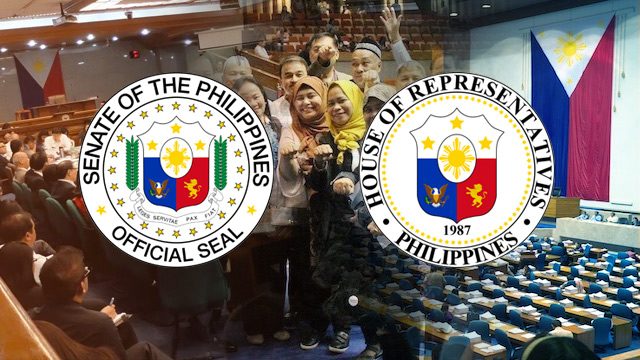SUMMARY
This is AI generated summarization, which may have errors. For context, always refer to the full article.

MANILA, Philippines – “Significant differences” of the Senate and House versions of the Bangsamoro Basic Law (BBL) may mean more heated debates among legislators in the coming weeks.
The House of Representatives approved its version of the BBL on Wednesday, May 30, while the Senate approved its own version a day after. (READ: Bangsamoro region ‘lesser than ARMM’ feared)
In a statement on Saturday, June 2, Senate Minority Floor Leader Franklin Drilon flagged “significant differences” between both versions, starting with the issue of political dynasties.
The Senate wanted a ban, wherein party representatives cannot hold office if he or she is related up to the 2nd civil degree of consanguinity or affinity to another party or district representative in the same parliament. (READ: Bangsamoro region will fail if dynasties are not banned, lawmakers told)
There is no counterpart provision in the House version. The Bangsamoro Transition Commission “highly opposed” the ban on political dynasties, according to Drilon.
Both chambers will also have to agree whether or not Palawan is “historically part” of the Bangsamoro territory, and if the Bangsamoro people are Filipino citizens, pursuant to Article IV of the Constitution.
Meanwhile, Drilon said the Senate deleted provisions pertaining to the “reserved, concurrent, and exclusive powers” of the Bangsamoro government, and removed the powers to “conduct inquiries in aid of legislation,” as well as subpoena powers.
But the House retained the provisions on “reserved, concurrent, and exclusive powers.”
Drilon also said that both chambers will have to “work hard” to reconcile their differences on how taxes will be collected in the Bangsamoro.
The House wanted the Bangsamoro to share only 25% of its income to the national government, while the Senate insisted on equal sharing. (READ: BBL should ensure wise fiscal spending in Bangsamoro – Dominguez)
Bicam
Meanwhile, the Senate proposed a provision for an annual block grant or share in internal revenue. The House version does not contain such provision.
The Senate version also maintained the 39 municipalities in North Cotabato as part of the territorial jurisdisction of the Bangsamoro. The House version, on the other hand, deleted the 39 municipalities as part of the core areas that comprise the Bangsamoro.
Senate wanted to prevent the Bangsamoro Parliament to include the procurement of firearms, ammunition, and explosives in its annual appropriations law. There was no such provision in the House version.
The Senate and the House also differed in the establishment of the Bangsamoro police.
The Senate proposed a Bangsamoro Regional Police, headed by a regional director to be selected by the Chief Minister from a list of nominees. The House version wants the secretary of the Department of the Interior and Local Government to appoint the regional director. (READ: Duterte on BBL: No separate Bangsamoro police, military)
Lastly, the Senate removed a provision for the creation of a Shari’ah Judicial Bar and Council tasked to recommend nominees to the Shari’ah Courts. The House voted to retain the provision.
Both houses of Congress will attempt to iron out these differences and come up with a reconciled version of the BBL during a bicameral conference committee that will be convened before session resumes on July 23. – Rappler.com
Add a comment
How does this make you feel?
There are no comments yet. Add your comment to start the conversation.